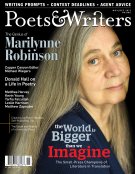Four hundred words. No bylines. A focus on the text itself. And a staunch no-crony rule.” So states the mission of SCOUT (scoutpoetry.com), the poetry-review website launched last February by poets Kathleen Ossip and Spencer Short in response to what the pair saw as a reviewing culture more interested in personalities and literary controversies—and therefore more at risk of nepotism, vindictiveness, and self-censorship—than in the substance of poems. As such, the site aims to restore the focus of poetry criticism to poetry itself by publishing short, anonymous reviews. “SCOUT is for avid readers of poetry,” says Ossip, “people who can use some help navigating the sea of poetry books being published.”
While many journals and magazines publish poetry reviews, there are few dedicated sources for criticism and perhaps fewer that offer critics the space to write outside of poetry-world politics. In a community as close-knit as that of contemporary American poetry, critics—who are frequently poets themselves—can feel obligated to praise a book for fear of professional backlash. “The available venues for poetry reviews are few,” Ossip says. “And the venues that publish intelligent, well-written, well-argued reviews, and avoid both puffery and hatchet jobs, are thin on the ground.”
Furthermore, reliable review outlets are often constrained by audience or space limitations. Publishers Weekly, which like SCOUT publishes concise and anonymous reviews, is more targeted toward publishing and bookselling professionals than general readers. Long-form outlets like the New York Review of Books and Boston Review, meanwhile, provide intelligent commentary—a small fraction of which is dedicated to poetry—but the lengthy essays aren’t conducive to quick, regular consumption. Ossip says she envisions readers checking SCOUT as part of their regular online routine, to find a steady stream of concise, poetry-focused reviews. SCOUT offers two to three reviews each week, covering collections that have appeared in the previous six months.
Ossip and Short work to ensure that coverage is broad, while allowing reviewers the option to choose which titles they cover. SCOUT currently has a team of twenty-four reviewers, who are all poets themselves; most are former students and colleagues of Ossip and Short, though the editors are actively seeking new contributors through the website. Reviewers can propose a book to review, or may present several options to Ossip and Short, who will select one for inclusion. Since the site’s launch, SCOUT reviewers have explored books by a range of poets, including Claudia Rankine, Douglas Kearney, Sally Wen Mao, Paul Muldoon, and Divya Victor. Publishers and authors may also submit books to be considered for review.
The SCOUT editorial process is rigorous: One reviewer, Jen Levitt, says that of the five reviews she has written for SCOUT, four required several rounds of revisions with the editors. And while the work is timeconsuming and unpaid, Levitt doesn’t mind that her name isn’t attached to her pieces. The anonymity of a SCOUT review, she believes, allows for a freer engagement with the text. “I think it’s really smart not to have bylines,” Levitt says. “Not so much because we can feel free to skewer a book, but because relationships and networking don’t get in the way of talking critically about poems, of trying to understand a book of poems on its own terms.”
Amanda Calderon has received fellowships from Poets House and the Norman Mailer Writers Colony. Her work has appeared in Poetry, Kenyon Review, and Words Without Borders. She lives in New York City.









